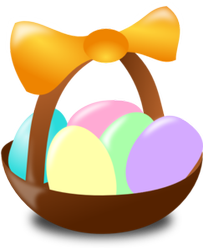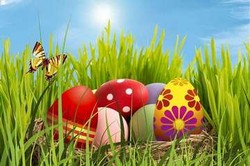Easter Sunday is the Sunday following the first Full Moon after the Vernal Equinox. Huh?
The vernal equinox is also known as the first day of spring in the northern hemisphere. The vernal equinox is special because day and night are the closest to being the same length (due to the position of the earth relative to the Sun.)
Christians added their own meaning to Easter (which we won't cover here.) The rules for determining the date to celebrate Easter were set by the Christian church and based on the rules for Jewish passover (which in turn was based on the paths of the Sun and Moon.)
The date we actually celebrate Easter now is actually based on historical data which isn't quite accurate. Having Easter move around is pretty inconvenient. There's often talk of moving it to a fixed Sunday so that could happen in future.
So the key thing to understand here is that the changes in the Moon and Sun as seen from the earth have long been recognised and recorded (before modern astronomy allowed us to understand the relationship between the Moon, Sun and Earth.) Celebrations and traditions were often tied to astronomical patterns that reoccurred each year.














 Avengers Iron Man Costume for Kidson 05/24/2012
Avengers Iron Man Costume for Kidson 05/24/2012
 Avengers Captain America Costume for Kidson 05/25/2012
Avengers Captain America Costume for Kidson 05/25/2012
 Avengers Thor Costume for Kidson 05/25/2012
Avengers Thor Costume for Kidson 05/25/2012
 Avengers Hulk Costume for Kidson 05/25/2012
Avengers Hulk Costume for Kidson 05/25/2012


Did you learn something about Easter?
Interesting page!